ten good things returns (february 2007)
hi folks... so, i guess december and january's editions of this have bitten the dust. i'm gonna try to get back to doing this monthly again though, and i've been brainstorming things to mention for a while now (some of the following is old news in real life, actually)... anyway...
10.

i don't know too much about carla bozulich, actually. i know she was in the geraldine fibbers-- a band i've heard of for years but never actually listened to. i became curious about her when her record evangelista kept coming up time and time again among the top ten of 2006 lists on the WFMU blog (click on this link for *literally hours worth* of good suggestions).
anyway, evangelista makes a nice evil twin sister to scott walker's freaky epic the drift (which probably-- and predictably-- would have my vote for best record of 2006). both are demanding, peculiar and alarmingly vulnerable records that will undoubtedly make your friends call you pretentious. bozulich is a little more visceral than scott... sometimes scott sounds like he's floating in from outer space; bozulich comes straight from the gut. the arrangements have a similar non-melody to the stuff on the drift, but they're less orchestral-- more to the point, i guess. the same goes for her singing, which often reaches patti smith levels of fearlessness, and anchors the otherwise avant-garde arrangements to solid bases of raw emotion. it's not an everyday sort of listen, but when you're in the mood, this is deep, dark stuff.
the closest this album comes to an accessible single is her cover of a song by low, which is good to begin with. here it is, as a point of entry...
carla bozulich, "pissing" mp3
9.
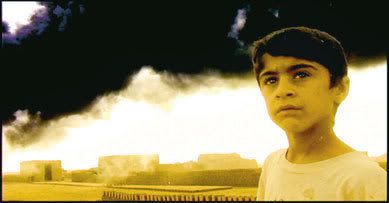
james longley's iraq in fragments is somewhat of a godsend as far as political documentaries go. first and foremost, it looks absolutely beautiful-- and the lushness with which he views a country i am used to seeing almost entirely in abject disorder adds a shockingly new sense of tragedy to the current ordeal in the region. furthermore, the film's aesthetics are also its primary (and relatively exclusive) source of commentary. beyond looking and moving and splicing and editing, the content is devoted almost entirely to the voices of iraqi citizens. no western experts arrive to explain the situation. no well-meaning activists re-iterate familiar arguments against the bush administration (however noble). longley lets iraqis speak for themselves, and avoids embellishing the arguments.
this impressionistic take on world politics gives the doc a distinctly cinematic quality, and at times it has more in common with italian neo-realism than michael moore or errol morris. longley has a great knack for capturing movements and reactions. he's as much a portrait painter as he is an historian. and most importantly, he leaves room for contemplative space in his film. enough time to think, as well as react.
8.
well, winter is nearly over, and so far i've managed to avoid my yearly, three-day cold and fever combo. i get the same illness twice a year, whenever there's a significant change in weather, almost without fail.
but not this year.

this winter i replaced my evening cup of coffee with a single glass of unsweetened greeen tea per night. i have yet to get legitimately sick (hangovers don't count). antioxidants, y'all! sniffles be gone!
7.
it's a shame that philip k. dick's the three stigmata of palmer eldritch doesn't quite have the reputation of books like a scanner darkly or do androids dream of electric sheep?, because-- for my money-- it's a better novel than either. the story involves the usual p.k. dick themes-- dissolving identities, drugs, god, virtual reality, alienation-- but it maintains a sharper and more consistent sense of dread than most of what i've read by him. it's never silly (like VALIS)... or convuluted (like a scanner darkly)... or even particularly pulpy (like UBIK). the narrative manages to be both theoretically abstract (on account of its metaphysics) and claustrophobically intimate (because no one does drug-addled alienation quite like p.k. dick), and there are moments of genuine freakishness that are tough to dismiss as acid-casualty delusions or sci-fi dorkery.
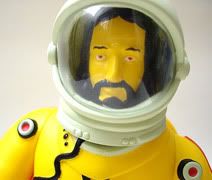
(...i ran a google image search for "ROBOT JESUS" and this came up...)
the novel's concept of god is particularly eerie and foreboding. p.k. dick's god is omnipotent but strangely powerless-- like a security system with a highly developed consciousness. i don't know too much about his particular breed of mysticism, but if more typical concepts of god are often dismissed as wish fulfillments ("the opiate of the masses", etc.), than dick's version certainly doesn't seem to grant many wishes. in fact, what comes to be known as god in palmer eldritch is no less melancholic and impotent than any of its human creations, giving rise to an imaginary universe without any points of exit or relief, including death.
6.
about a month back, my roommate-- a doctoral candidate in literature-- made the rather masochistic decision to attend the MLA conference here in philadelphia. from what i gather-- and building on my knowledge of its art-world equivalent (the CAA conference)-- this is one of those awkward events where dozens of crusty, bed-headed academics emerge from their caves, take the only suit they own to the dry cleaners, and make desperate attempts to convince some poor univeristy that they have enough of a command on lacan's notion of jouissance to afford them a new life whereby they resume making their outrageous student loan payments. from what i gather, these events tend to bring out the worst in people-- and apparently the jargony bullshit was flying pretty high this year. high enough, in fact, that my roommate has created a blog which he plans on devoting entirely to fake academic journal titles-- the sillier the better. he's accepting submissions, too... if you wanna blow off a little steam after your next discussion of meta-poetics (or whatever-the-fuck), than you should take a look:
http://academicnoise.blogspot.com/
5.
jacques rivette's maddeningly opaque, defiantly playful and wholeheartedly confusing film out 1: spectre is precisely the demanding, one-of-a-kind spectacle that would only appeal to about a dozen or so of the characters in my life. but, for better or worse, that dozen will probably read my livejournal, so i'm afraid i'm gonna have to ramble on about this...
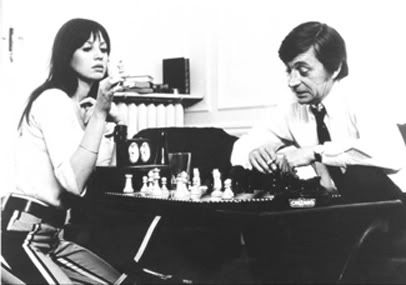
first and foremost, rivette's films are so stylistically distinct that i always find myself in awe of their structure, even when i'm less than enthused about his overall thesis (as in la belle noiseuse-- a film that amounted to a rather maudlin defense of macho neo-expressionism, in spite of its wonderfully executed inquiries into the nature of painting). rivette is almost aggressively playful-- a childish momentum nearly overrides all else. if i am to interpret out 1 as a critique of counter-culture (and to some extent it is), i'm not able to typically lament anything. i feel a certain obligation towards pleasure; something tantamount to a game of hide and seek with a toddler determined to wear me out. here i should mention that, at a cool 225 minutes, spectre is the short version of the original (rarely screened) out 1, which clocks in at roughly 12 fucking hours! if there is a filmmaker out there with a greater ability to withstand pleasure, i have yet to find that person. and as a film, it is literally a labrynth of games-- one narrative digresses into abstract frolic only to give way to another one-- all tied to a peculiar (and painfully unsatisfying) conspiracy narrative that remains stubbornly incoherent to the bitter end. it's the kind of film that you spend most of your viewing time trying to establish some spectatorial relationship to, and when it was over, i was left with the feeling that my own attempt at apprehension (let alone contemplation) might well have been "the point" itself.
not that it's the kind of film with "a point", obviously.
4.

philadelphia's own icy demons have been receiving a lot of playtime in my studio lately. they make the kind of accessible music that can only come from people with an "experimental" background (members include folks from need new body, man man, and the criminally underrated bablicon). you can hear the influence of people like moondog or captain beefheart contributing to the mix... and there's certainly a trace here and there of the wonderful pre-fusion jazz made by herbie hancock or miles davis in the mid-seventies... but at the end of the day, it's straight pop music for the most part, in all its un-pretentiousness. here's a song i absolutely love right now:
icy demons, "bunny's" mp3
3.
if there's anything downright tragic about adulthood, it's how boring we become with our relationships to animals. when i was about seven years old, i could force my poor mother to endure hours of useless trivia about the various species of reptiles and amphibians currently inhabiting the american northeast... and i could chase frogs around backyard streams for hours on end, engrossed in a minature suburban universe. nowadays, i often do little more than brush my cat away when he tries to sniff the pee pee i've just filled the toilet with.
anyway, a simple, yet satisfying, way to reclaim this forgotten sense of wonder is to simply pick a new animal to be enamoured with.

and, thus, the elephant hereby joins the snake, the cat and the frilled necked lizard in the lexicon of my favorite animals. i don't know why, really. they're just cool.
2.
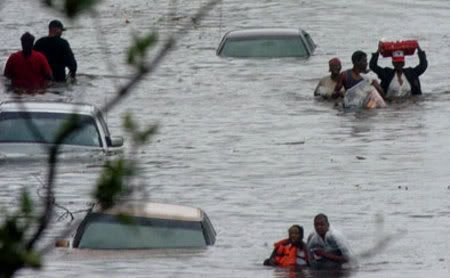
obviously, i wouldn't want to suggest that anything good came out of hurricane katrina, but i am extremely happy that spike lee got to make when the levees broke: a requiem in four acts before oliver stone or jerry bruckheimer decided to plop will smith into the superdome (or whatever... you know something like this is undoubtedly in the works). and he did it right-- he devoted four hours to it, bringing the same delicate balance of reverence and snarkiness that made his other great documentary-- 1997's four little girls-- such an underrated morsel of documentary filmmaking. in four, hour-long installments, the doc has enough time and space to really delve into the political, economic and emotional ramifications of the disaster, and seems to get better the more it moves along. the third and fourth installments are, in my opinion, the best-- where the film moves away from the familiar headline stuff to explore the rich and precarious history of the city itself-- as well as the political and economic measures that will be necessary to rebuild it.
i wouldn't necessarily say that lee shows restraint in his approach to the subject-- especially considering that some of the film's highlights come from enabling everyday people to express their outrage-- but he definitely steps back a bit and lets those interviewed provide the commentary. and some of the interviews are truly great. the plentiful segments with garland robinette (who hosted the radio show which featured the famous call-in from ray nagin) are particularly informative. robinette is both pragmatic and emotional about the situation, unravelling the various missteps of the relief effort in illuminating ways while maintaining a quite palpable sense of disgust and regret. also, lee wisely returns to civilian interviews throughout the film-- the same dozen or so everyday people provide commentary on a variety of topics-- and the hierarchy of screen-time doesn't deal them a disadvantage. there's something democratic to the way the interviews are arranged. sean penn and kanye west don't command anymore screen time than the two visibly drunk women who take us on a tour of the remains of their homes. there's something effectively panoramic about the balance of experts, victims, politicians, musicians, celebrities and activists showcased throughout the film. lee tends to like "the big picture" for the most part-- he is more prone to ensembles than to characters; to crane shots instead of close-ups-- and this sensibility is put to really admirable use in levees, making it an essential document of one of the most disgraceful periods of my own, personal lifetime.
1.
finally, since i devoted the majority of a month to it, i figured i'd close with ten good things about samuel r. delany's novel dhalgren (even though i talked about it in my last real post):
10. first off, i'm happy to have discovered a cool, old-school paperback copy of it, that looks like this...
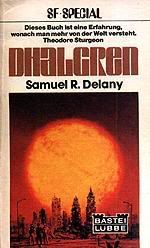
9. the variety of characters that appear and disappear throught the novel become a collective catalyst for constructing the narrative in a multitude of voices... there's the stream-of-consciousness poetics of the kid's journal... the stuffy academia of visiting-poet ernest newboy... the racialized slang of the scorpions... it's as if it's being written in several languages at once, and these language experiments not only spice up the form of the novel, but also actively construct much of its content.
8. this is probably a bit of a stretch, but dhalgren sorta reminded me of d.h. lawrence's women in love. or maybe it just reminded me of what i liked about women in love. both are novels that ultimately consist of a series of conversations that i'm thrilled to be able to listen in on, without necessarily agreeing or disagreeing with what's being said. also, the character lanya sort of reminded me of lawrence's ursula, and i think i have a crush on both of them. (i think it's good to have crushes on characters in books. especially for dudes. it gets us away from the purely visual...)
7. i like that, despite its apocalyptic atmosphere, dhalgren doesn't qualify as either utopian or dystopian literature. i'm tempted to say it's like everyday life itself-- on account of its ups and downs, and its ambiguities. but that's not exactly right either. i guess what's remarkable is the way delany invents his own systems of ups and downs, and moves towards new ambiguities. perhaps the reason i wasn't bothered by its cryptic nature is that i never expected the novel to directly mirror my own sensibilites. i could let it run its course...
6. my friend justin was describing the book to me before i dove into it, and he said that when he pictured the characters, he imagined them looking like the dudes in the warriors. i guess i did too, which is cool cause i loved the warriors (even though the similarities end there).
5. (if you haven't read the book, this will mean nothing to you, but...) the first conversation between the kid and the astronaut would probably be my favorite moment in the book, were i picking favorites. it just encapsulates what's so exciting about it in general really well.
4. trying to determine whether or not the character of george harrison (who, in the novel, might best be described as a black stud demi-god who may or may not be a rapist) is intentionally meant to evoke george harrison the beatle is enjoyably infuriating.
3. the radical sexuality explored in the book also cleverly avoids the utopian/dystopian split. the rough sex is legitimately rough... and uncomfortable... and occasionally questionable... and is almost never presented as something lacking in consequence. at the same time, its decadence refuses to point toward moral ruin, and delany thankfully ignores the sorry breed of existential foreboding that almost always attends anything orgiastic in contemporary art-making. like everything else in the book, sex is a work-in-progress... something with depth and dimension and movement and passion, but neither fatalistic nor idealistic in nature.
2. brass orchids, the name of the book of poetry written by the book's central character, is a cool name for just about anything. and, in the context of the book, it's pretty funny, too.
1. dhalgren earns its avant-garde embellishments. it reminded me a bit of william faulkner in that regard. dhalgren is a novel that seems to emerge from a distinct genealogy-- or even a geography, perhaps-- and when it veers away from its constructed logic, i could feel the labor that went into its logic moving along with it (does that make any sense?) what i mean is that i felt aware of the care that went into its universe, as well as the sense of delight that went into pulling that universe apart again, stylistically.
10.

i don't know too much about carla bozulich, actually. i know she was in the geraldine fibbers-- a band i've heard of for years but never actually listened to. i became curious about her when her record evangelista kept coming up time and time again among the top ten of 2006 lists on the WFMU blog (click on this link for *literally hours worth* of good suggestions).
anyway, evangelista makes a nice evil twin sister to scott walker's freaky epic the drift (which probably-- and predictably-- would have my vote for best record of 2006). both are demanding, peculiar and alarmingly vulnerable records that will undoubtedly make your friends call you pretentious. bozulich is a little more visceral than scott... sometimes scott sounds like he's floating in from outer space; bozulich comes straight from the gut. the arrangements have a similar non-melody to the stuff on the drift, but they're less orchestral-- more to the point, i guess. the same goes for her singing, which often reaches patti smith levels of fearlessness, and anchors the otherwise avant-garde arrangements to solid bases of raw emotion. it's not an everyday sort of listen, but when you're in the mood, this is deep, dark stuff.
the closest this album comes to an accessible single is her cover of a song by low, which is good to begin with. here it is, as a point of entry...
carla bozulich, "pissing" mp3
9.

james longley's iraq in fragments is somewhat of a godsend as far as political documentaries go. first and foremost, it looks absolutely beautiful-- and the lushness with which he views a country i am used to seeing almost entirely in abject disorder adds a shockingly new sense of tragedy to the current ordeal in the region. furthermore, the film's aesthetics are also its primary (and relatively exclusive) source of commentary. beyond looking and moving and splicing and editing, the content is devoted almost entirely to the voices of iraqi citizens. no western experts arrive to explain the situation. no well-meaning activists re-iterate familiar arguments against the bush administration (however noble). longley lets iraqis speak for themselves, and avoids embellishing the arguments.
this impressionistic take on world politics gives the doc a distinctly cinematic quality, and at times it has more in common with italian neo-realism than michael moore or errol morris. longley has a great knack for capturing movements and reactions. he's as much a portrait painter as he is an historian. and most importantly, he leaves room for contemplative space in his film. enough time to think, as well as react.
8.
well, winter is nearly over, and so far i've managed to avoid my yearly, three-day cold and fever combo. i get the same illness twice a year, whenever there's a significant change in weather, almost without fail.
but not this year.

this winter i replaced my evening cup of coffee with a single glass of unsweetened greeen tea per night. i have yet to get legitimately sick (hangovers don't count). antioxidants, y'all! sniffles be gone!
7.
it's a shame that philip k. dick's the three stigmata of palmer eldritch doesn't quite have the reputation of books like a scanner darkly or do androids dream of electric sheep?, because-- for my money-- it's a better novel than either. the story involves the usual p.k. dick themes-- dissolving identities, drugs, god, virtual reality, alienation-- but it maintains a sharper and more consistent sense of dread than most of what i've read by him. it's never silly (like VALIS)... or convuluted (like a scanner darkly)... or even particularly pulpy (like UBIK). the narrative manages to be both theoretically abstract (on account of its metaphysics) and claustrophobically intimate (because no one does drug-addled alienation quite like p.k. dick), and there are moments of genuine freakishness that are tough to dismiss as acid-casualty delusions or sci-fi dorkery.

(...i ran a google image search for "ROBOT JESUS" and this came up...)
the novel's concept of god is particularly eerie and foreboding. p.k. dick's god is omnipotent but strangely powerless-- like a security system with a highly developed consciousness. i don't know too much about his particular breed of mysticism, but if more typical concepts of god are often dismissed as wish fulfillments ("the opiate of the masses", etc.), than dick's version certainly doesn't seem to grant many wishes. in fact, what comes to be known as god in palmer eldritch is no less melancholic and impotent than any of its human creations, giving rise to an imaginary universe without any points of exit or relief, including death.
6.
about a month back, my roommate-- a doctoral candidate in literature-- made the rather masochistic decision to attend the MLA conference here in philadelphia. from what i gather-- and building on my knowledge of its art-world equivalent (the CAA conference)-- this is one of those awkward events where dozens of crusty, bed-headed academics emerge from their caves, take the only suit they own to the dry cleaners, and make desperate attempts to convince some poor univeristy that they have enough of a command on lacan's notion of jouissance to afford them a new life whereby they resume making their outrageous student loan payments. from what i gather, these events tend to bring out the worst in people-- and apparently the jargony bullshit was flying pretty high this year. high enough, in fact, that my roommate has created a blog which he plans on devoting entirely to fake academic journal titles-- the sillier the better. he's accepting submissions, too... if you wanna blow off a little steam after your next discussion of meta-poetics (or whatever-the-fuck), than you should take a look:
http://academicnoise.blogspot.com/
5.
jacques rivette's maddeningly opaque, defiantly playful and wholeheartedly confusing film out 1: spectre is precisely the demanding, one-of-a-kind spectacle that would only appeal to about a dozen or so of the characters in my life. but, for better or worse, that dozen will probably read my livejournal, so i'm afraid i'm gonna have to ramble on about this...

first and foremost, rivette's films are so stylistically distinct that i always find myself in awe of their structure, even when i'm less than enthused about his overall thesis (as in la belle noiseuse-- a film that amounted to a rather maudlin defense of macho neo-expressionism, in spite of its wonderfully executed inquiries into the nature of painting). rivette is almost aggressively playful-- a childish momentum nearly overrides all else. if i am to interpret out 1 as a critique of counter-culture (and to some extent it is), i'm not able to typically lament anything. i feel a certain obligation towards pleasure; something tantamount to a game of hide and seek with a toddler determined to wear me out. here i should mention that, at a cool 225 minutes, spectre is the short version of the original (rarely screened) out 1, which clocks in at roughly 12 fucking hours! if there is a filmmaker out there with a greater ability to withstand pleasure, i have yet to find that person. and as a film, it is literally a labrynth of games-- one narrative digresses into abstract frolic only to give way to another one-- all tied to a peculiar (and painfully unsatisfying) conspiracy narrative that remains stubbornly incoherent to the bitter end. it's the kind of film that you spend most of your viewing time trying to establish some spectatorial relationship to, and when it was over, i was left with the feeling that my own attempt at apprehension (let alone contemplation) might well have been "the point" itself.
not that it's the kind of film with "a point", obviously.
4.

philadelphia's own icy demons have been receiving a lot of playtime in my studio lately. they make the kind of accessible music that can only come from people with an "experimental" background (members include folks from need new body, man man, and the criminally underrated bablicon). you can hear the influence of people like moondog or captain beefheart contributing to the mix... and there's certainly a trace here and there of the wonderful pre-fusion jazz made by herbie hancock or miles davis in the mid-seventies... but at the end of the day, it's straight pop music for the most part, in all its un-pretentiousness. here's a song i absolutely love right now:
icy demons, "bunny's" mp3
3.
if there's anything downright tragic about adulthood, it's how boring we become with our relationships to animals. when i was about seven years old, i could force my poor mother to endure hours of useless trivia about the various species of reptiles and amphibians currently inhabiting the american northeast... and i could chase frogs around backyard streams for hours on end, engrossed in a minature suburban universe. nowadays, i often do little more than brush my cat away when he tries to sniff the pee pee i've just filled the toilet with.
anyway, a simple, yet satisfying, way to reclaim this forgotten sense of wonder is to simply pick a new animal to be enamoured with.

and, thus, the elephant hereby joins the snake, the cat and the frilled necked lizard in the lexicon of my favorite animals. i don't know why, really. they're just cool.
2.

obviously, i wouldn't want to suggest that anything good came out of hurricane katrina, but i am extremely happy that spike lee got to make when the levees broke: a requiem in four acts before oliver stone or jerry bruckheimer decided to plop will smith into the superdome (or whatever... you know something like this is undoubtedly in the works). and he did it right-- he devoted four hours to it, bringing the same delicate balance of reverence and snarkiness that made his other great documentary-- 1997's four little girls-- such an underrated morsel of documentary filmmaking. in four, hour-long installments, the doc has enough time and space to really delve into the political, economic and emotional ramifications of the disaster, and seems to get better the more it moves along. the third and fourth installments are, in my opinion, the best-- where the film moves away from the familiar headline stuff to explore the rich and precarious history of the city itself-- as well as the political and economic measures that will be necessary to rebuild it.
i wouldn't necessarily say that lee shows restraint in his approach to the subject-- especially considering that some of the film's highlights come from enabling everyday people to express their outrage-- but he definitely steps back a bit and lets those interviewed provide the commentary. and some of the interviews are truly great. the plentiful segments with garland robinette (who hosted the radio show which featured the famous call-in from ray nagin) are particularly informative. robinette is both pragmatic and emotional about the situation, unravelling the various missteps of the relief effort in illuminating ways while maintaining a quite palpable sense of disgust and regret. also, lee wisely returns to civilian interviews throughout the film-- the same dozen or so everyday people provide commentary on a variety of topics-- and the hierarchy of screen-time doesn't deal them a disadvantage. there's something democratic to the way the interviews are arranged. sean penn and kanye west don't command anymore screen time than the two visibly drunk women who take us on a tour of the remains of their homes. there's something effectively panoramic about the balance of experts, victims, politicians, musicians, celebrities and activists showcased throughout the film. lee tends to like "the big picture" for the most part-- he is more prone to ensembles than to characters; to crane shots instead of close-ups-- and this sensibility is put to really admirable use in levees, making it an essential document of one of the most disgraceful periods of my own, personal lifetime.
1.
finally, since i devoted the majority of a month to it, i figured i'd close with ten good things about samuel r. delany's novel dhalgren (even though i talked about it in my last real post):
10. first off, i'm happy to have discovered a cool, old-school paperback copy of it, that looks like this...

9. the variety of characters that appear and disappear throught the novel become a collective catalyst for constructing the narrative in a multitude of voices... there's the stream-of-consciousness poetics of the kid's journal... the stuffy academia of visiting-poet ernest newboy... the racialized slang of the scorpions... it's as if it's being written in several languages at once, and these language experiments not only spice up the form of the novel, but also actively construct much of its content.
8. this is probably a bit of a stretch, but dhalgren sorta reminded me of d.h. lawrence's women in love. or maybe it just reminded me of what i liked about women in love. both are novels that ultimately consist of a series of conversations that i'm thrilled to be able to listen in on, without necessarily agreeing or disagreeing with what's being said. also, the character lanya sort of reminded me of lawrence's ursula, and i think i have a crush on both of them. (i think it's good to have crushes on characters in books. especially for dudes. it gets us away from the purely visual...)
7. i like that, despite its apocalyptic atmosphere, dhalgren doesn't qualify as either utopian or dystopian literature. i'm tempted to say it's like everyday life itself-- on account of its ups and downs, and its ambiguities. but that's not exactly right either. i guess what's remarkable is the way delany invents his own systems of ups and downs, and moves towards new ambiguities. perhaps the reason i wasn't bothered by its cryptic nature is that i never expected the novel to directly mirror my own sensibilites. i could let it run its course...
6. my friend justin was describing the book to me before i dove into it, and he said that when he pictured the characters, he imagined them looking like the dudes in the warriors. i guess i did too, which is cool cause i loved the warriors (even though the similarities end there).
5. (if you haven't read the book, this will mean nothing to you, but...) the first conversation between the kid and the astronaut would probably be my favorite moment in the book, were i picking favorites. it just encapsulates what's so exciting about it in general really well.
4. trying to determine whether or not the character of george harrison (who, in the novel, might best be described as a black stud demi-god who may or may not be a rapist) is intentionally meant to evoke george harrison the beatle is enjoyably infuriating.
3. the radical sexuality explored in the book also cleverly avoids the utopian/dystopian split. the rough sex is legitimately rough... and uncomfortable... and occasionally questionable... and is almost never presented as something lacking in consequence. at the same time, its decadence refuses to point toward moral ruin, and delany thankfully ignores the sorry breed of existential foreboding that almost always attends anything orgiastic in contemporary art-making. like everything else in the book, sex is a work-in-progress... something with depth and dimension and movement and passion, but neither fatalistic nor idealistic in nature.
2. brass orchids, the name of the book of poetry written by the book's central character, is a cool name for just about anything. and, in the context of the book, it's pretty funny, too.
1. dhalgren earns its avant-garde embellishments. it reminded me a bit of william faulkner in that regard. dhalgren is a novel that seems to emerge from a distinct genealogy-- or even a geography, perhaps-- and when it veers away from its constructed logic, i could feel the labor that went into its logic moving along with it (does that make any sense?) what i mean is that i felt aware of the care that went into its universe, as well as the sense of delight that went into pulling that universe apart again, stylistically.